MREeater
I was a senior staff officer in the Idaho Army National Guard. I deployed to northern Iraq in in December 2004, and returned home in November 2005. My blog focuses on military life of a Guardsman, as I saw it, with forays into other topics from time to time.
Wednesday, December 20, 2006
A Surge in Stupidity
Various numbers are in play, but they tend to range from 20,000 to 40,000, or two to four divisions. That might be enough to make a small difference in just Baghdad for a time, but it won’t help the overall situation. Consider the higher number. I’ve seen various tooth to tail ratios, usually 1 fighter to 3, or 4 or 7 supporters. In my unit I’d estimate it was closer to 1 to 1, or perhaps 1 to 2. Much of the support work has been contracted, leaving soldiers to be soldiers, not cooks.
Assume 1 to 2. That leaves 20,000 soldiers available for duty. If they work 12 hour shifts every day, that leaves 10,000 available for patrol at a time. 12/7 is unsustainable for long. Soldiers need to eat and sleep and maintain weapons and vehicles and plan and practice for the next operation, so more likely is three 8-hour shifts daily, which puts about 6700 soldiers on the street.
Soldiers run in packs. We wouldn’t leave the FOB with less than 9, and that was for a routine op. 4 HMMWVs, each with 5 soldiers, makes 20 per patrol, or checkpoint, or something small like that. Even at a checkpoint you have to have sufficient firepower that the soldiers can’t get overwhelmed. They have to have enough security to hold off an attack until a quick reaction force arrives. I’d want 20 soldiers at a check point. So the 4 divisions can set up 335 checkpoints, in a city of 5-6 million. That won’t have a momentum shifting impact. It might stabilize a small area, until they leave, but that’s it.
Even worse, I don’t hear any analysis of how they pick the number. You don’t just throw in some troops and hope they make a difference. You start with an objective and plan what it will take to achieve it. Example; in armored combat static defense has a 3 to 1 advantage over the attacking force. One battalion in defense can stand off 3 attacking. So if you know the size of the enemy force you’re attacking, you know the size of the force to attack with.
Some smart Army planner somewhere has, I guarantee, made a plan to secure Baghdad, or at least discrete chunks of it. How many roads in, how many soldiers per checkpoint per road, vehicle and weapons system needed, operations tempo (8 or 12 hour shifts, or whatever), etc. I was a planner for 3 years and did this all the time, our plans shop did it constantly, it’s a very well developed skill of the Army. I suspect these plans won’t see the light of day because they will either show the fallacy of sending in just 4 divisions, or will show how small an effect the 4 divisions will have.
I think Americans don’t support the war because it is pointless. If we had a true plan, clear objectives and timetables, I think most folks would sign on. They won’t support the current open ended no-plan plan. And of course, the big question is, what exactly are we getting for lives and money? Save face? Is that it?
Tuesday, August 29, 2006
On Patrol in Kirkuk
Wednesday, June 14, 2006
Six months later
Slipping seamlessly back into civilian life does not exactly describe my experience since returning from Iraq. I remembered how to drive a car, operate a washer, look up a statute, turn right on red and ride a bicycle, but I’ve enjoyed odd little hiccups of reentry.
In my absence, my civilian job migrated to another employee, never to return, so I have been learning new job duties at the Idaho Industrial Commission. My military position, Inspector General, was a casualty of the 116th’s reorganization and it vanished, dropping me into a slot for which I’ve not been trained, with duties that have not been explained to me, and with a boss who has not been identified. With these parameters it will be either very easy or impossible to succeed.
These things have changed. I am now easily startled; a ringing phone will accelerate my pulse, and a loud sound will stop it. I get very emotional hearing about injured and killed soldiers, as if I personally knew the victim. When I left Iraq I had a certain fondness for the Iraqi people, but my heart has hardened with each American casualty and I have little good will left for Iraqis. I have much more experience with listening to people explain their problems, but have much less patience for it. I have been strangely reluctant to balance my check book or figure out my monthly finances. Time spent with my children feels incredibly precious.
My memories of Iraq are bright and fresh and yet it seems to have happened a long time ago. I miss being involved in such an important and historic endeavor; the simplicity of the lifestyle (no cooking, no dishes to wash, few choices to make); my fellow soldiers; the way work and personal life were as one. I don’t want to go back, but would if called.
The sky is very blue here, and I’m still waiting for a hot day. It’s great to be back.
Before and after, or then and now, pix below.
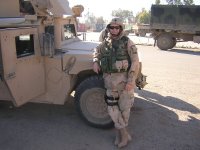

Tuesday, June 06, 2006
Craven and Cowardly
Before I get to number two, I’d also like to note that it seems like Marine tactics should be reviewed. Marines purposefully instill a violent warrior ethos, which can serve them well in war. It can also lead to atrocities if not balanced by a strong values. Maybe I just notice Marines more but it seems like they get into this kind of trouble more than soldiers. Soldiers outnumber marines in Iraq by, what, 5 to 1, or something like that? Wouldn’t you expect more bad news about soldiers? Also, Marines seem to be in the news more for losing large groups at a time. I recall an incident last fall when 12 or so Marines, including female Marines, were killed by a roadside bomb.
I haven’t done the research so can’t really say, but I’d bet that more Marines are killed per capita than soldiers. I don’t think this is just because they are in more violent places. I have great respect for Marines and their war fighting capability; I’m just saying that I hope a high level review is conducted of their tactics and ethos because it looks like Marines are involved in problems that should be prevented.
The other thing I know about the killings in Haditha is that I keep hearing media reports of Iraqis complaining about the killings. (Apparently people were killed; whether Marines did that improperly I don’t know.)
Ya know, I am sick of hearing those complaints, and I have about zero sympathy for the Iraqis. I do feel sorry for the kids, but the adults, f**k them. Those bastards know damn good and well who the insurgents are, the ones who are trying to kill Americans and other Iraqis, and either they sympathize or they’re too goddam craven to stand up and report the info to the authorities.
These towns and neighborhoods are composed such that everybody knows what’s going on. They are much more personal than here in the States where you might not know your neighbor and be aware of their comings and goings. The people, culture and infrastructure make it pretty much impossible for the neighbors not to know.
If the Iraqis would step up and help stop the insurgents, our billions of dollars could help get the country back on its feet. But no, they won’t help out. They just stand around and bitch about how bad it is.
I know I’m generalizing, that there are exceptions, but yes, I think they are generally a bunch of cowards. They are not providing the crucial help and information, and they enable the insurgents to destroy infrastructure and kill innocents. F**k them and the camels they rode in on. American young people are getting killed over there, trying to help stand up the country. I say a pox on the worthless bastard Iraqis.
I hope the Marines didn’t do what has been alleged. It is wrong and not consistent with our ethos, but I can see how our military forces could wig out in that situation, given the depth of my feelings even at this remove. A bad deal all the way around.
Monday, May 15, 2006
Medals

These are the four medals that all soldiers deployed to Iraq get. I think they are in order of precedence from left to right, although I'm not exactly sure. From left to right they are: Armed Forces Reserve Achievement Medal; Global War on Terrorism Meda; Iraqi Campaign Medal; and National Defense medal. I had 3 or 4 of the AFRAMs, and this is my third ND medal, though many reservists got it for the first time on deployment. It is pretty much an active duty medal.
Medals became a very charged issue in my unit. The scuttlebutt was that because the 42 ID was a NG division, it had an unrealistically stiff standard for medals and combat badges.
Wednesday, April 19, 2006
Deployment Cost Me My Job
Also, I had asked for the new duties. I had wanted them as extra duties to the job I held when I left. However, as it turned out, I lost the old duties and just got the new ones. I thought the change had occurred because of my request.
Over the three months I've been back at work, I've heard a few comments and learned some things that made me wonder. I had kind of an epiphany today and realized that my request had nothing to do with the change. I can't go into much detail because folks at work read this blog, but I'm comfortable with my conclusion.
 Anyway, another casualty of war. A minor one in many ways, but one that changed my life and career, forever. Still, I don't have to share my office with this critter as I did in Kirkuk, so life is still better now.
Anyway, another casualty of war. A minor one in many ways, but one that changed my life and career, forever. Still, I don't have to share my office with this critter as I did in Kirkuk, so life is still better now.
Friday, April 07, 2006
1945 vs. 2005
1945 - NCO'S had a typewriter on their desks for doing daily reports.
2005- Everyone has an Internet access computer, and they wonder why no work is getting done.
1945 - We painted pictures of girls on airplanes to remind us of home.
2005 - Do it now and see what happens
1945 - If you got drunk off duty your buddies would take you back to the dorms to sleep it off.
2005 - If you get drunk they slap you in rehab and ruin your career.
1945 - You were taught to aim at your enemy and shoot him.
2005 - You spray 500 bullets into the brush, don't hit anything, and retreat because you're out of ammo.
1945 - Canteens were made of steel, and you could heat coffee or hot chocolate in them.
2005 - Canteens are made of plastic, you can't heat anything in them, and they always taste like plastic.
1945 - They collected enemy intelligence and analyzed it.
2005 - They collect your pee and analyze it.
1945 - If you didn't act right, the First Sergeant put you in the brig until you straightened up.
2005 - If you don't act right, they start a paper trail that follows you forever.
1945 - Medals were awarded to heroes who saved lives at the risk of their own.
2005 - Medals are awarded to people who work at headquarters.
1945 - You slept in barracks like a soldier.
2005 - You sleep in a dormitory like a college kid.
1945 - You ate in a mess hall, which was free, and you could have all the food you wanted.
2005 - You eat in a dining facility, every slice of bread or pad of butter costs, and you better not take too much.
1945 - We defeated powerful countries like Germany and Japan.
2005 - We fight ideological wars with no specific enemies like the war on drugs and the war on terrorism, with no victory in sight.
1945 - If you wanted beer and conversation you went to the NCO or Officer's Club.
2005 - The beer will cost you $3.50, membership is forced, and someone is watching how much you drink.
1945 - The Exchange had bargains for soldiers who didn't make much money.
2005 - You can get better and cheaper merchandise at Wal-Mart and K-Mart.
1945 - We called the enemy names like "Krauts" and "Japs" because we didn't like them.
2005 - We call the enemy the "opposing force" or "aggressor" because we don't want to offend them.
1945 - Wars were planned and run by generals with lots of important victories.
2005 - Wars are planned by politicians with lots of equivocating.
1945 - All you could think about was getting out and becoming a civilian, again.
2005 - All you can think about is getting out and becoming a civilian, again.
Wednesday, April 05, 2006
Stop using our troops to score cheap political points
I was reading an article about the towns in Wisconsin that voted to bring home the troops. The AP article written by Emily Fredrix contained the following:
"The morale of soldiers - and their safety - could dip when they hear about such referendums passing, said Bill Richardson, treasurer of Vote No To Cut And Run, a group that opposed the measures.
"It's a political statement and it's hurting people and it could cost lives," said Richardson, 63, a one-time bandmaster in the Wisconsin Army National Guard."
I'll tell you, I am so sick of people speaking for "the soldiers" in Iraq. It's just stupid on its face. "The soldiers" are just like Americans everywhere. They differ and have different experiences and opinions.
Sure, some soldiers may get bummed out that the folks back home don't support the war. Others will probably get excited that there is a chance they'll get out of there early, or not have to go back. I just returned from an 18 month deployment, 11 of which were in Iraq, and I'm still a member of the National Guard. I think most soldiers, being educated and on the whole pretty intelligent, will realize the votes are just politics and not likely to translate to anything meaningful in their lives.
Anytime a person speaks for "the soldiers" as a group the person is just trying to use the soldiers as an excuse to promote his or her own viewpoint. I think it is exploiting our troops, and I'm sick of hypocrites who say they support the troops using them for cheap political purposes.
Tuesday, April 04, 2006
A simple thing
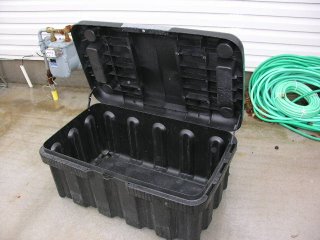
I have been unpacking my stuff that just arrived from Iraq. I had a large molded-plastic foot locker packed with various and sundry items; books, another pair of boots, posters, 4-cup coffee pot, DVDs, shampoo, batteries, etc. Stuff that I didn't really want to toss out, but stuff that I could live without. The foot locker, once so important to me, is now stored ignominiously outside in the rain with the hoses.
In preparation to come home, in September we packed some boxes and foot lockers , stashed them in a CONEX and locked it up. While in Iraq I had received packages in the mail (Yes!) and used these mailing boxes to consolidate items that went into the foot locker that went into the CONEX. As I unpacked today, I emptied the mailing boxes and tossed them into my garbage can.
As I unpacked I recalled the many mailing boxes I discarded while I was in Iraq. The difference was that in Iraq I stripped off any names and addresses on the boxes before tossing them. We didn't want the bad guys to get our names and ranks, and especially didn't want them getting the return addresses. In one round up of insurgents, the soldiers recovered a stack of magazines which still carried the mailing labels showing names and addresses. Many of them were sent to the soldier's home in the states and then forwarded to the FOB, thus showing soldier's home address. We worried that the family back home could be targeted by the knuckleheads.
Here I didn't worry about the names on the packages. A tiny but telling freedom that we all enjoy.
Jumpy at home
Each time it shut, which was every couple of minutes or so, it would bang, and I would jump. After a few minutes I was feeling kind of woozy and my heart was hammering away. I almost left the room. I was not able to concentrate on the meeting I was attending.
I was not a jumpy person before Iraq, but I sure am now.
***
Some of our equipment has begun to arrive. Half of my stuff was unloaded last weekend, and hopefully the other half will arrive and can be unloaded next drill.
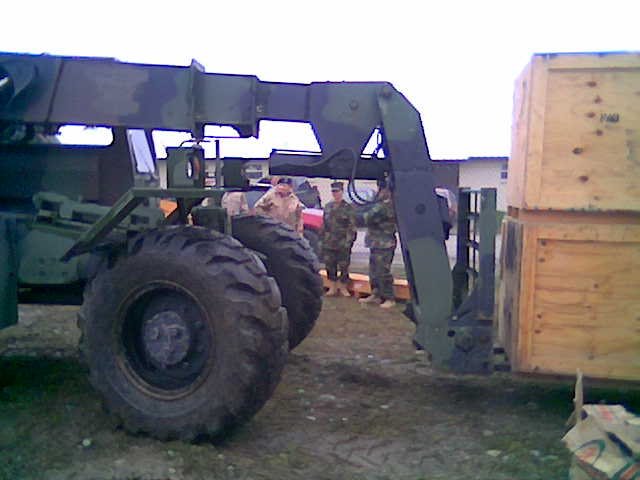
***
Went to yet another change of command ceremony on Sunday. The incoming commander told me that his chief priority is recruiting. Not training, recruiting. Big Army is talking about doing away with at least one Guard Brigade, and key factor will be personnel strength. Of the five under discussion, ours most recently came off deployment and is reorganizing, so our strength percentage is the lowest of the group. The losing brigade will be broken up and assigned out, piecemeal, to other units. Also, a good many jobs, both full-time and weekend, will disappear.
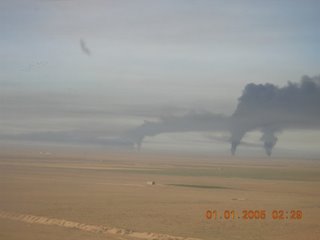
The first picture is of burning oil wells.

The second picture is also of burning oil wells.

The last picture is of an oil well being put out. Note the water being sprayed on the fire, and the white smoke.
Sunday, April 02, 2006
More artwork
More pix of military artwork. If you should happen to want a high res copy for some reason, drop me a line and I'll be happy to send one or more to you. I'm still struggling with the photo ability of blogger, so they don't look as organized as I'd like, but I'm working on that.
BTW, some of our CONEX's got here, but not all of them. Most of my neat stuff is still in transit. The stuff I had to send early, that I thought I'd do without, is here. The important stuff, like my TV, that I sent later is still in transit.
And, a pre-emptive apology; I may accidently upload an image more than once; sorry.

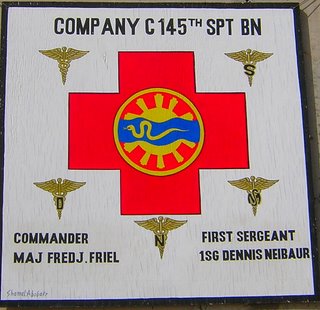


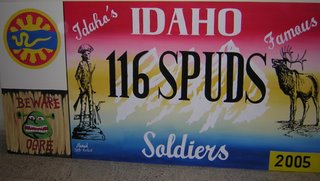
Wednesday, March 22, 2006
Artwork
Monday, March 20, 2006
Art work
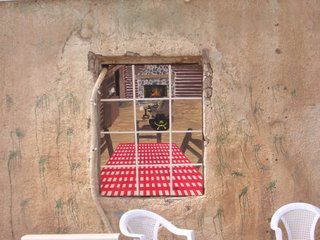
around the FOB. The window looks like you're looking into a western cabin, complete with cavalry hat. It was painted on a piece of plywood that was covering a window. Almost every window was covered, I think for shrapnel or blast protection. If a rocket hit near the window, it would shatter the window and send the glass flying.
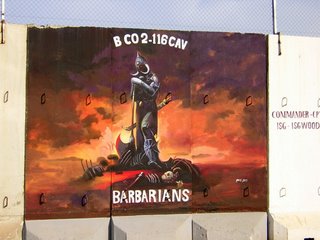 The other picture is of art work painted on a concrete barrier. Fairly typical.
The other picture is of art work painted on a concrete barrier. Fairly typical.
Sunday, March 12, 2006
Transfer of Authority
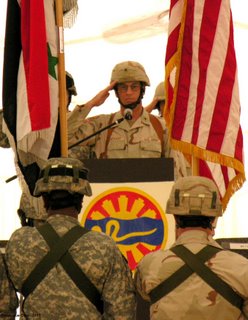
This is a photo from our outgoing transfer of authority, when we handed the battle off to the 101st Airborne. This shows our Commanding General saluting. Our unit crest is below him, and he's surrounded by both the US and Iraqi flags. Our soldier is in tan, and the 101st soldier is in the new ACUs.
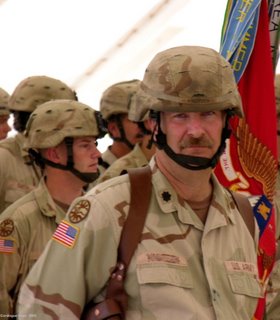
This photo is of a battalion commander, awaiting the action. The 101st Div Commander was late for the ceremoney, and we all stood around waiting for him.
This photo shows our XO, surrounded by cameras from mostly Iraqi media.
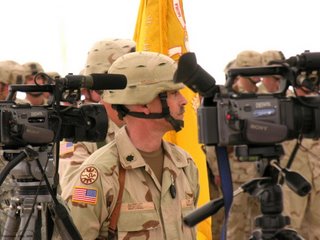
Saturday, March 11, 2006
Self Destruction

Sometimes the bad guys just take themselves out. The first picture shows what had been an Iraqi Army checkpoint between Kirkuk and Hawija. Hawija was a hot spot, with lots of former Baathists and al-Quaeda members and sympathizers. I read an article that lately the people of Hawija have been turning on the al-Quaeda types.
Anyway, one night a car/suicide bomber pulled up to the checkpoint building and detonated, and as you can see pancaked the building. The driver was killed, and I think the Iraqi soldier manning the checkpoint. However, several other Iraqi soldiers were sleeping on top of the building. They rode it down, and walked away.

The other picture is of a car (BMW) driven by a terrorist. He and his sidekick stopped to emplace an IED, but it exploded. The point of detonation was behind the front tire. What was left of the driver was on the other side of the car. The sidekick was pretty much vaporized; only his foot was found.
Wednesday, March 08, 2006
Purple Heart Ceremony
Tuesday, March 07, 2006
Still waiting
We can't really do training schedules because of the huge reorganization and reshuffle. When a battalion moves from south Idaho to north Idaho, that tends to suck all available time. Essentially we will be doing only individual catch-as-catch-can (aka hip pocket) training.
Our equipment is arriving in Colorado, and is being staged to ship here. It should be here this month, and then we can start to unpack. Personally, I'm most looking forward to getting my nice Bose computer speakers so I can play music while at work.
Sunday, March 05, 2006
Analysis? Whose Analysis?
Saturday morning on drill weekend, I went to my work place and finished setting up my new office, then went to track down my laptop computer. I had left it with the IT folks to configure for the Gowen Field network. After getting it back, I stopped by my company's orderly room, which is in the same building as the IT office.
I have been trying for about 18 months to get an evaluation report fixed. It was sent to me in Iraq, but no one had the program necessary to print it. I couldn't get the company clerk to send me a printable version, so I just stopped in yesterday to have her print it off. It needs to be signed and then formally filed.
As I talked to her, the company First Sergeant walked by, looked at me and said "I think you're on our list." He then went to check and returned saying, yes, I was on the list to submit to a urinalysis. This was about 0930. I told him fine (having no choice in the matter) but that I needed to prepare for the test (drinking a bunch of coffee and water).
This is pretty common because they don’t give you any warning that you get to contribute a sample, and you may have already drained the holding tank by the time you’re notified.
I went back to my office, worked on the computer, and drank liquids. Having taken what seems like a zillion piss-tests (probably a few dozen), I have learned that I want to really have to go before I try to fill the bottle.
The way the Army collects its samples is that you take off your shirt, wash your hands (to avoid contaminating the sample), and fill the bottle. The uncomfortable part is that there is a test proctor who wants to observe the action to ensure that you don’t fill the bottle with something other than your own personal warm specimen. And by observe the action, I mean the guy wants to see your equipment as you produce the sample. That’s why you have to take off your shirt; it might impede the view.
I tend to seize up and get stage fright when someone is watching me so closely. Accordingly, it helps to have a considerable pressure built up at test time. I achieved that after about an hour and a half. I returned to the orderly room at 1120, ready for action, but found that the proctors had left early for lunch so they could be back at 1300 to participate in a change of command ceremony. They wouldn’t be available until later the ceremony.
No way could I wait that long, so we decided I might just try later in the afternoon, after the ceremony, even though I would have to depressurize before then. They ended up not being available later, so I didn’t take the test. As the 1st Sgt. said, if you miss one of the “random” tests you tend to pop up on the next three or so “random” tests. So I’ve got that to look forward to.
The bright spot, for me, is that I’m not female. They have the same requirement of the eagle-eyed proctor. I suspect that their experience is probably even less pleasant than what the males endure.
Saturday, March 04, 2006
Chemical Ali's Swimming Pool
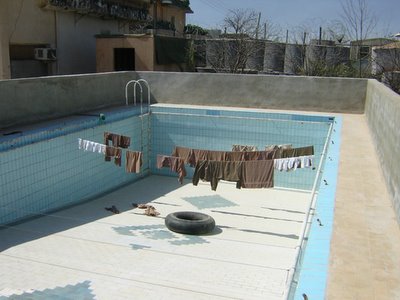 , known for gassing and killing thousands of Kurds. He had several villas west of Kirkuk, one of which was in the middle of a small FOB. Our soldiers lived in the villa and other buildings.
, known for gassing and killing thousands of Kurds. He had several villas west of Kirkuk, one of which was in the middle of a small FOB. Our soldiers lived in the villa and other buildings.As you can see, the soldiers turned Chemical Ali's swimming pool into their clothesline for drying laundry.
Friday, March 03, 2006
Hillbilly armor
This type of photo is now forbidden by the Army to be posted, but since I’m in the civilian mode at the moment, I’m not subject to that rule. (This weekend at drill is another story.) The Army’s rationale is that posting such photos will help the enemy by allowing them to learn of the effectiveness of their attacks, so that they can improve their techniques. I agree with this, and would not post a photo that could help the enemy or endanger US soldiers.

In this case, the attack was months ago, and I could post the picture without referencing when or where the attack occurred. I do not think the enemy could learn much from it. I have chosen not to post the photo, however, I guess because it could encourage the enemy. Even if they can’t learn from it, they could look at it and see that IED attacks can be affective. Boost morale, in effect.
So instead I have posted a picture of what we called “Hillbilly Armor.” This photo is of a 5-ton truck. The window was removed, and a piece of one-quarter inch steel was slipped down into the door. This was the protection for the vehicle as it was driven from Kuwait, through Baghdad, to Kirkuk.

The other photo is of a HMMWV with hillbilly armor strapped to the sides of the bed rails. Soldiers left our FOB every day in this vehicle, and this was their protection. This was used only for a very short daily trip into Kirkuk, and no one in the back was ever injured due to lack of armor. Still, the soldiers were not very happy about riding in this.
The US is making good progress in equipping the force with up-armored vehicles, but it still has a way to go. Our unit made efforts to allocate the safest vehicles to the most unsafe areas. The Army being the Army, some of the best vehicles were assigned to senior leadership, and would sometimes just sit for days without leaving the FOB. Soldiers saw this and complained bitterly about it, and to their credit, our leadership did try to respond and allow their vehicles to be used when not otherwise needed. However, by then it was too late and the “urban myth” of the up-armored HMMWV that never leaves the FOB was widely believed.
Thursday, March 02, 2006
After the search
 This photo shows a scene right after a knock and search of this Kirkuk home. It was a couple of days before the Constitutional referendum and we were searching in neighborhoods around polling places. The idea was to see if we could find weapons, to send the signal that we were out looking for weapons in case anyone got a bright idea, and to reassure the locals that we were working to prevent election violence.
This photo shows a scene right after a knock and search of this Kirkuk home. It was a couple of days before the Constitutional referendum and we were searching in neighborhoods around polling places. The idea was to see if we could find weapons, to send the signal that we were out looking for weapons in case anyone got a bright idea, and to reassure the locals that we were working to prevent election violence.Seems odd, but the people liked us searching, for these reasons. They didn’t seem to mind us searching their homes, but who knows for sure.
We entered the front yard of this home. As usual, there is no grass, just either packed earth or concrete. We saw the camouflage uniform hanging on the clothesline, and this immediately drew our attention. Turned out the uniform belonged to the homeowner, who was a captain in the Iraqi Army.
Anyway, after that bit of drama, we completed the search and chatted with the captain. The picture shows one of our soldiers, relaxed and smoking a cigarette, talking with someone on the other side of the gate.
Wednesday, March 01, 2006
FOB Images
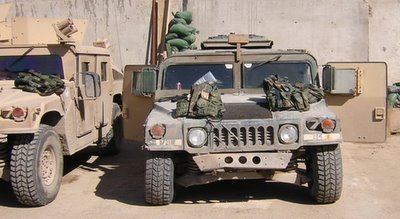 This post shows some various photos. This first one showing two Hummers illustrates the effect of the armor on the Hummv. The one on the right has the add on package, which you can tell by the door window. Note how much lower it is than the one on right, and how the tires are tilted in at the top. This is due to the increased weight. Once the suspension gets this bad, they don't handle well and risk rolling over.
This post shows some various photos. This first one showing two Hummers illustrates the effect of the armor on the Hummv. The one on the right has the add on package, which you can tell by the door window. Note how much lower it is than the one on right, and how the tires are tilted in at the top. This is due to the increased weight. Once the suspension gets this bad, they don't handle well and risk rolling over.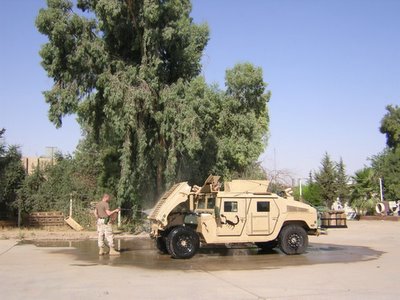
Even in a war zone you have to keep the car clean.
And you have to keep the parking lot clean.
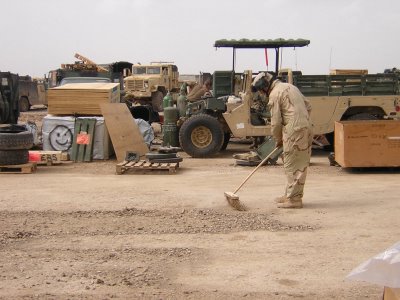
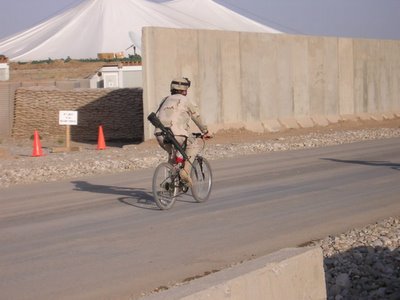 And you have to get around. This soldier bought a bicycle in the PX and used it to get around, even in the 115 degree heat. Of course, the soldier also had to carry his weapon over his shoulder.
And you have to get around. This soldier bought a bicycle in the PX and used it to get around, even in the 115 degree heat. Of course, the soldier also had to carry his weapon over his shoulder.
Monday, February 27, 2006
Missing equipment
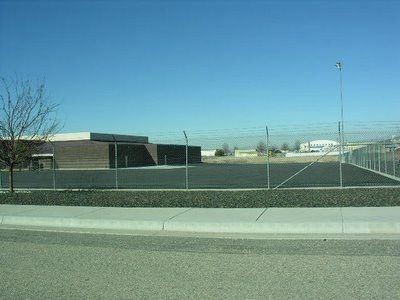 An article in the New York Times today reported that Governors are concerned that the Iraq war is stripping NG units of equipment needed to respond to state emergencies. I have not read the article because I don't subscribe to the online NYT, but I read a couple of references to it.
An article in the New York Times today reported that Governors are concerned that the Iraq war is stripping NG units of equipment needed to respond to state emergencies. I have not read the article because I don't subscribe to the online NYT, but I read a couple of references to it.As I have written, we did leave a good deal of our equipment in Iraq, including weaspons and weaspons systems, radios, night vision equipment, and vehicles. Many of the vehicles we shipped back have been diverted to a Depot Rebuild, and we won't see them again.
So, I guess I'd have to agree that right now we have a vastly reduced capacity to respond to a state emergency, though we're not exactly shorn little lambs, shivering in the breeze.
The picture is of our company motor pool in February, 90 days after we returned, and not a single vehicle in the compound.
 The other pic shows one of the intangible advantages to being in the Guard. Driving to drill, I got to see this fantastic sunrise, which I otherwise would have slept through.
The other pic shows one of the intangible advantages to being in the Guard. Driving to drill, I got to see this fantastic sunrise, which I otherwise would have slept through.
Wednesday, February 22, 2006
The Long War
This person also noted that by far most of the spending is on conventional weapons and programs and very little is budgeted for anti-insurgency efforts. I took his point to be that the military-industrial complex is simply using the Long War as a rationale for defense spending in order to enrich the defense industry. This is a fairly cynical conclusion, though many people seem to reach it. I suppose some folks might support the war for personal monetary gain, but I don't think there's some big conspiracy to conduct war as a means of consumption in order to enrich the suppliers.
Anyway, at last drill, I attended a briefing on the Army's big picture plan. Apparently Guard and Reserve units, and active units with some different wrinkles, are going to be put on a six year plan. The year after a deployment, such as my unit is in right now, the unit will be recovering from the deployment. Manpower will be down and the unit will be missing much of its equipment.
As the unit rebuilds its combat power over the next few years, it gets increased funding, eventualy resulting in a deployment, or National Training Center rotaion, in the 5th or 6th year. Starting year four, the units will start doing 3-week Annual trainings (instead of 2-week).
As I sat there, it struck me that the plan is now for a Guard unit to be deployed every six years. This dovetails with the idea of The Long War.
Saturday, February 11, 2006
Turmoil
Pretty much all senior leadership has turned over. Brigade cmdr, Bde Cmd Sgt Major, all battalion cmdrs and most CSMs. We have a new S1, S2, S6, S7, Deputy Bde Cmdr, and probably a new S3 (These are the various primary staff officers.) We have a new JAG, and the IG slot is going away.
In addition, we are completely reorganizing the brigade. The M1 tanks are going away, and those soldiers will become MPs and cooks and unmanned aerial vehicle operators and military intelligence types. The support battalion is moving to another part of the state. The truck drivers and material handlers and mechanics are going to become part of a recon and security battalion, driving Bradleys. The combat engineers in north Idaho are going to become the new support battalion. All this is happening in the months after returning from deployment, and leaders are trying to be sensitive to additional demands being placed on soldiers.
The numbers of people qualified in their jobs is going to plummet, and lots of folks will have to go to schools. Some folks will choose not to stay in because they don’t want to leave home again so soon, or because they don’t want to do the new job, and our personnel numbers are going to decline.
Recruiting is going to be a huge push. Idaho is one of five pilot states that will now pay a “bounty” on recruits. If I refer a recruit, I get $1,000 when s/he signs up, and another $1,000 when s/he completes schooling. Pretty much anyone is eligible for the bounty, even civilians.
Reunion
I also couldn't help but notice the uniforms. I counted six different uniforms. Some wore green BDUs with beret, some with black boots, others with tan boots. Some wore tan DCUs with beret, or with the field cap. Some wore the new grey uniform. One soldier wore his PT uniform, I guess because he haad to take a PT test. It was a motley crew, and reminded me of the Iraqi Army, which also seemed to wear whatever they wanted.
The reason for our variation is that the new gray uniform is being phased in, while the green one is going out. However, the new ones haven't been issued yet, so any gray ones were self-purchased. Many soldiers have their uniforms still in shipment back from Kuwait, so the tan DCU is the only one they have. Some of our soldiers did not deploy, so only have the green uniform.
This variety in a sense reflects the turmoil the brigade is going through as it adjusts and reorganizes.
Monday, February 06, 2006
Funeral

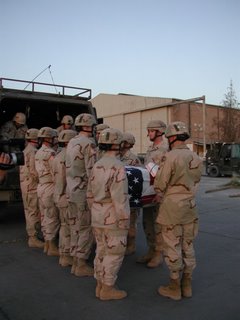

Here are some pictures, the likes of which you probably won't see in traditional media. This is a "ramp ceremony" for a soldier killed in Iraq.
I had some trouble getting the pictures in order. What you're seeing is the coffin being unloaded from the ambulance. An honor guard, lead by the Brigade Chaplain, carrying the coffin into the aircraft, and the aircrew saluting the coffin as it is emplaced.
Most of the rest of the Brigade is in formation in the background, saluting the fallen soldier.
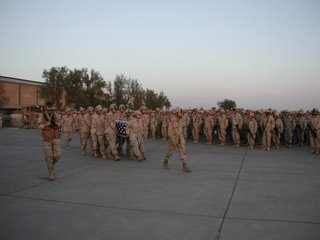
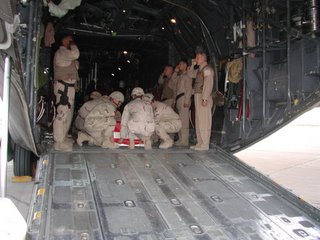
Friday, February 03, 2006
Drill surprises
I talked to a soldier who has been giveninformation about our upcoming drills that has her upset. By some regulation, we don't have to drill the first 60 days after demobilizing, so our first mandatory drill is next weekend, Feb 11-12. Our equipment hasn't arrived from Iraq yet, so we won't have too much to do in February. It should be here by March.
Traditionally, drill is the first weekend of the month. This may vary for the Superbowl, Mother's Day and opening day of hunting season. Most other weekends don't get much consideration for conflicts. Our April drill is the first weekend, i.e., April 1-2. Turns out that spring break for the school kids is the week of March 27-31. So, the last weekend of spring break will be drill, and apparently we will be drilling a MUTA 5, i.e., Friday night and all day Saturday and Sunday.
I had planned to take my kids on a vacation during spring break. This was to be our big reunion after me being gone for 18 months. I now have to reassess. Being back on Friday instead of Sunday will take some adjustments. The soldier I talked to was very annoyed about this imposition, as she also had plans to travel with her kids. It is not easy to get out of drill, even though the concrete repercussions aren't that severe. It's more a matter of pissing off your boss than specific punishment. Plus, it's bad form for a leader.
Another circumstance also had her irritated, but this story needs a bit of background. When we mobilized in June 2004, a few thousand local soldiers assembled in a local arena for a goodbye tribute. Mayors from 6 local towns showed up, but the mayor of Boise didn't. He is a Democrat, and the rest are republicans. Our Adjutant General, a 2-star (Major General), spoke at the rally. He is the top state Guard officer, appointed by the (Republican) governor. At the rally he took a shot at the Boise mayor for not being there.
This put the Boise mayor on the defensive, and he showed up at our departure to shake everyone's hand and give out a City of Boise lapel pin. He also put together a plan for a big welcome home party, involving local units and many of the larger corporations and businesses.
Since we have the first 60 days off from drill, the party couldn’t be in the first two months if attendance is mandatory. At first everyone is sick of the whole army scene, and probably wouldn’t attend voluntarily. Also, it’s cold and the streets can be slick. So, the party was planned for Memorial Day.
That has a nice connection to honoring the troops, and the weather will be nice. As it turns out, in order to support the party, drill has been scheduled for Memorial Day weekend. So for the third Memorial Day we will be in uniform and away from our families. This is also a MUTA 5, and will pretty much eat up the 3-day weekend.
Many soldiers are not in a happy frame of mind about military service, after Iraq. Such unnecessary impositions will probably contribute to soldiers voting with their feet.
Home Town Humor
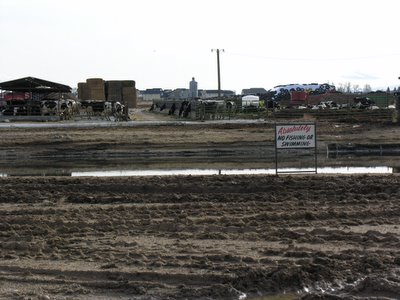
A dairy farm operates right next to the new high school. The owner seems to have a sense of humor, as he recently posted this sign next to a drainage pond. The pond drains the milking shed and the feeding troughs, so it's essentially a cesspool. If you can't read the sign, it says "Absolutely No Fishing or Swimming!"
You might notice the houses in background. They have been built in the last month, as Kuna grows, a classic case of coming to the nuisance. The diary farm has been there for years, but not the town has grown up to its edge. Pretty soon, I suppose, efforts to run the farm and its flys and odors off will begin.
Tuesday, January 31, 2006
Don't ask, don't tell
Per the Army’s regulations on “Don’t ask, don’t tell”, investigation into alleged homosexuality is pretty tightly controlled. A soldier can’t be investigated upon a mere rumor. It takes an overt statement or act. Only the soldier’s commander can initiate the investigation, and who can be contacted during the investigation is limited. Since we had the explicit statements, we were justified in beginning an investigation.
The sender had used the Army’s email system to track down the email of the recipient, and he set up a bogus name to try to hide his identity. However, the latter effort was not successful, and we found the sender pretty quickly. His commander asked him if he sent the email, he admitted it, and he was discharged and sent home lickety split, within a couple of weeks. Normally a discharge takes a month or more.
The system worked pretty well. The sender’s identity was not revealed, nor was the reason for his discharge. A few people did know, of course, but word didn’t get around like you might expect. If the sender hadn’t sent the email, or if he had sent it to a willing recipient, no one would have known and he would have been left alone. The sender was a filler from a coastal state, not from one of the hometown units, so repercussions are unlikely, other than his military career is over.
I didn’t hear of any other gay soldiers, but lesbian soldiers were pretty visible. There was a general agreement about who was probably a lesbian, and I came to believe that the scuttlebutt was accurate. For one reason, I talked to a female soldier who roomed with an admitted lesbian. (They were both fine with that.) This source confirmed the rumors, and I guess she’d know as well as anyone. They seemed fairly open about it, but made no statement or committed no acts that would trigger an investigation. The command climate was such that it had many more important things to worry about than a person’s sexual orientation. As long as command was not forced to take action, it didn’t.
Thus, some of these gals were pretty casual about it. I ran into one when I was going home on leave and she was returning. She told me that her “partner” (code word for sweetheart) had split with her on leave, and she had to find and buy a new home, move out and then into the new place, all on her two weeks leave.
Interestingly, two of these lesbian soldiers were partners before we got mobilized. They were in the same section, and pretty much roomed together the entire deployment. In Iraq, the two of them shared a CHU, with just the two of them. Don’t you love the irony. A married couple couldn’t live together, and since they couldn’t even enter the other's living space they couldn’t have sexual relations. However the lesbian couple did get to room together, and do whatever they wanted, I guess.


